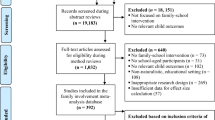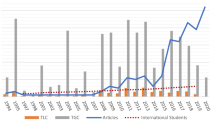Abstract
National demographics clearly demonstrate that children from culturally and linguistically diverse (CLD) backgrounds are on the rise. Many regions in the United States are experiencing unprecedented growth in English language learner (ELL) populations without adequately trained personnel to serve this unique population. Unfortunately, the demographic makeup of school psychologists has not kept up. There is a documented shortage of bilingual school psychologists. This shortage has created a gap in service delivery for children and families that are not native English speakers. With the increased demand in bilingual school psychology service delivery, challenges in training standards, recruitment, definitions in bilingualism, and certification/licensing have become evident. Although scholarship and research are limited, this article reviews the literature on bilingual school psychology, implications for practice, and highlights the challenges and opportunities in solidifying this unique specialty.
Similar content being viewed by others
References
Capps, R., Fix, M., Murray, J., Ost, J., Passel, J. S., & Herwantoro, S. (2005). The new demography of America’s schools: immigration and the no child left behind act. Washington, DC: The Urban Institute.
Clauss-Ehlers, C. S. (2009). Encyclopedia of cross-cultural school psychology. New York: Springer Publishing.
Covarrubias v. San Diego Unified School District, Civil Action No. 70-394-T (S.D. Cal. filed December 1, 1971).
Curtis, M. J., Hunley, S. A., & Grier, J. E. C. (2004). The status of school psychology: implications of a major personnel shortage. Psychology in the Schools, 41, 431–442.
Curtis, M. J., Lopez, A. D., Castillo, J. M., Batsche, G. M., Minch, D., & Smith, J. C. (2008). The status of school psychology: demographic characteristics, employment conditions, professional practices, and continuing professional development. Communiqué, 36, 27–29.
Curtis, M. J., Castillo, J. M., & Gelley, C. (2012). School psychology 2010: demographics, employment, and the context for professional practices—Part 1. Communiqué, 40(1), 28–30.
Diana v. California State Board of Education. No. C-70-37, United States District Court of Northern California (1970).
Flanagan, D. P., McGrew, K. S., & Ortiz, S. O. (2000). The Wechsler intelligence scales and Gf-Gc theory: a contemporary approach to interpretation. Boston: Allyn and Bacon.
Gopaul-McNicol, S., & Armour-Thomas, E. (2002). Assessment and culture: psychological tests with minority populations. San Diego: Academic Press.
Individuals with Disabilities Education Improvement Act of 2004. Pub. L. No. 108–446, 20, U.S.C. 1400 (2004).
Izquierdo, E. (2011). Two way dual bilingual education. In R. R. Valencia (Ed.), Chicano school failure and success: past, present and future (pp. 160–172). New York: Routledge.
Li, C., & Fiorello, C. A. (2011). Evolving practicum issues in school psychology preparation. Psychology in the Schools, 48(9), 901–910.
Lopez, E. C. (2008). Best practices in working with school interpreters. In A. Thomas & G. Grimes (Eds.), Best practices in school psychology (pp. 917–936). Bethesda: National Association of School Psychologists.
López, E. J., Salas, L., Arroyos-Jurado, E., & Chinn, K. (2004). Current practices in multicultural assessment by school psychologists. Forum: Qualitative Social Research, 5(3), 1–7.
Migration Policy Institute. (2010). Top languages spoken by English language learners nationally and by state (issue no. 3). Washington, D.C: Author.
National Association of School Psychologists. (2009). Recruitment of culturally and linguistically diverse school psychologists (position statement). Bethesda: Author.
National Association of School Psychologists. (2010). The NASP model for comprehensive and integrated school psychological services. Bethesda: Author.
National Association of School Psychologists. (2011a). Re: Bilingual school psychology interest group. Retrieved from http://www.nasponline.org/about_nasp/ig_bilingual.aspx.
National Association of School Psychologists. (2011b). Re: Programs with a focus on multiculturalism and/or bilingualism. Retrieved from http://www.nasponline.org/resources/culturalcompetence/multprograms.aspx#bccuny.
National Center for Education Statistics. (2012). The condition of education (NCES 2012045). Washington, DC: Government Printing Office.
National Center for Education Statistics. (2014). The condition of education 2014 (NCES 2014–083). Washington, DC: Government Printing Office.
Newell, M. L., Nastasi, B. K., Hatzichristou, C., Jones, J. M., Schanding, G. T., Jr., & Yetter, G. (2010). Evidence on multicultural training in school psychology: recommendations for future directions. School Psychology Quarterly, 25(4), 249–278.
O’Bryon, E. C., & Rogers, M. R. (2010). Bilingual school psychologists’ assessment practices with English language learners. Psychology in the Schools, 47(10), 1018–1034.
Ochoa, S. H., Powell, M. P., & Robles-Pina, R. (1996). School psychologists’ assessment practices with bilingual and limited English proficient students. Journal of Psychoeducational Assessment, 14, 250–275.
Ochoa, S., Rivera, B., & Ford, L. (1997). An investigation of school psychology training pertaining to bilingual psycho-educational assessment of primarily Hispanic students: twenty-five years after Diana v. California. Journal of School Psychology, 35(4), 329–349.
Ochoa, S. H., Riccio, C., & Jimenez, S. (2004). Psychological assessment and/or bilingual students: an investigation into school psychologists’ current practices. Journal of Psychoeducational Assessment, 22, 185–208.
Ortiz, S. O., Flanagan, D. P., & Dynda, A. M. (2008). Best practices in working with culturally diverse children and families. In A. Thomas & G. Grimes (Eds.), Best practices in school psychology (pp. 1721–1738). Bethesda: National Association of School Psychologists.
Ortiz, S. O., Ochoa, S. H., & Dynda, A. M. (2012). Testing with culturally and linguistically diverse populations: Moving beyond the verbal-performance dichotomy into evidenced-based practice. In D. P. Flanagan & P. L. Harrison (Eds.), Contemporary intellectual assessment: theories, tests, and issues (pp. 526–552). New York: Guilford Press.
Rhodes, R. L., Ochoa, S. H., & Ortiz, S. O. (2005). Assessing culturally and linguistically diverse students: a practical guide. New York: Guilford Press.
Sattler, J. M. (2014). Foundations of behavioral, social, and clinical assessment of children (6th ed.). San Diego: Sattler.
Sotelo-Dynega, M. (2009). The first official meeting of the bilingual school psychology interest group. Communiqué, 37, 30–31.
Sotelo-Dynega, M., Geddes, L., Luhrs, A., & Teague, J. (2009). What is a school psychologist? A national survey of the credentialing bodies of school psychologists. Poster presented at the annual meeting of the National Association of School Psychologists, Boston.
Styck, K. M. (2012). Preparing school psychologists for working with diverse students: does program accreditation matter? Current Issues in Education, 15(2). Retrieved from: http://cie.asu.edu/ojs/index.php/cieatasu/article/view/964.
Sue, D., & Sue, D. (2012). Counseling the culturally diverse: theory and practice (6th ed.). Hoboken: John Wiley & Sons Inc.
Valdes, G., & Figueroa, R. A. (1994). Bilingualism and testing: a special case for bias. New York: Ablex Publishing.
Valencia, R. (2008). Chicano students and the courts: the Mexican-American legal struggle for educational equality. New York: New York University Press.
Whaley, A. L. (2001). Cultural mistrust and mental health services for African Americans: a review and meta-analysis. Counseling Psychologist, 29, 513–531.
Author Note
This manuscript has not been previously published and is not currently being considered for publication elsewhere.
Author information
Authors and Affiliations
Corresponding author
Rights and permissions
About this article
Cite this article
Olvera, P., Olvera, V.I. Bilingual School Psychology: Challenges and Opportunities. Contemp School Psychol 19, 165–172 (2015). https://doi.org/10.1007/s40688-014-0034-6
Published:
Issue Date:
DOI: https://doi.org/10.1007/s40688-014-0034-6




